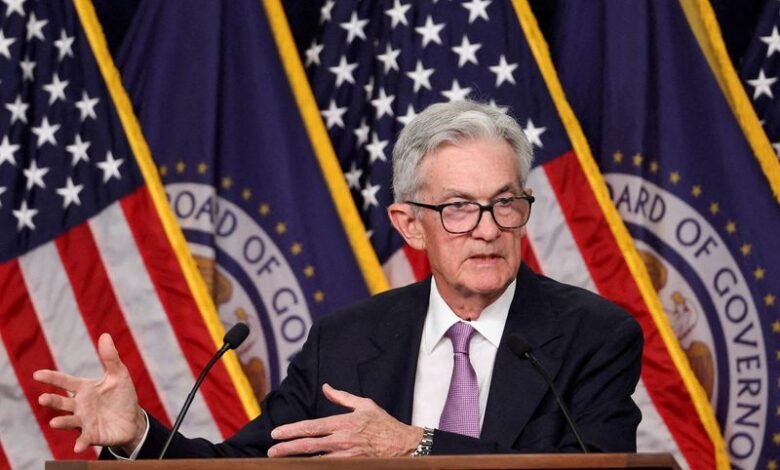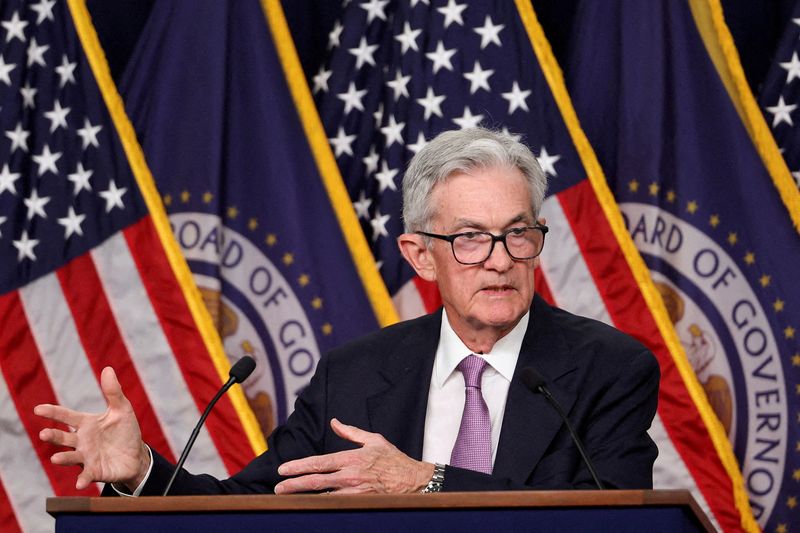Fed’s Powell says rates will ‘over time’ reach neutral level, not on preset course

By Howard Schneider
NASHVILLE, Tennessee (Reuters) -The U.S. economy seems poised for a continued slowdown in inflation that will allow the Federal Reserve to cut its benchmark interest rate and “over time” reach a level that is no longer holding back activity, Fed Chair Jerome Powell said on Monday in remarks that showed no obvious lean towards a faster or slower pace of reductions in borrowing costs.
“Disinflation has been broad-based, and recent data indicate further progress toward a sustained return to 2%,” the Fed’s targeted inflation level, Powell said in remarks to a National Association for Business Economics conference in Nashville, Tennessee.
“If the economy evolves broadly as expected, policy will move over time toward a more neutral stance,” Powell said. “But we are not on any preset course. The risks are two-sided, and we will continue to make our decisions meeting by meeting.”
In response to a question following his formal remarks, Powell said in terms of the outlook for rate cuts he saw “a process that will play out over time,” adding “this is not a Committee that feels like it’s in a hurry to cut rates quickly.”
The U.S. central bank’s policy-setting Federal Open Market Committee cut rates by half a percentage point at its Sept. 17-18 meeting, lowering the range of its policy rate from a 20-year high of 5.25%-5.50%, which it had maintained for 14 months, to the current 4.75%-5.00% range.
Economic projections released at that meeting showed the median policymaker expectation was for the rate to decline further to the 4.25%-4.50% range by the end of the year, to the 3.25%-3.50% range by the end of 2025, and for policy easing to end in 2026 with the rate around the longer-run estimated “neutral” level of 2.9%.
“If the economy performs as expected, that would mean two more cuts this year, a total of 50 (basis points) more,” Powell said. “We will do what it takes in terms of the speed with which we move.”
Investors have been divided over whether the Fed will slip into a series of quarter-percentage-point cuts now or perhaps be prompted to make another large cut if the job market weakens or inflation slows more than expected.
Stocks eased slightly and yields on Treasuries rose after Powell’s remarks. Rate futures traders leaned into bets the Fed will deliver a quarter-percentage-point rate cut rather than a second straight half-percentage-point cut in November.
ECONOMY ‘IN SOLID SHAPE’
Powell’s reference to “two-sided” risks, however, points to an open debate as data accumulate, with the release on Friday of the U.S. employment report for September being the first of two major labor market reports the Fed will receive before its Nov. 6-7 meeting. The most recent inflation data showed a headline rate of just 2.2%, near the Fed’s target, while a “core” measure stripped of food and energy costs has been stalled around 2.6% to 2.7% for four months.
Powell, however, said he felt that “broader economic conditions … set the table for further disinflation.”
Goods prices have been declining, while the once-sticky aspects of the service industry saw inflation now “close to its pre-pandemic pace,” Powell said.
Progress on housing inflation has been “sluggish,” the Fed chief said, but “the growth rate in rents charged to new tenants remains low. As long as that remains the case, housing services inflation will continue to decline.”

The job market remains “solid,” he said, with a 4.2% unemployment rate still a low level and around that which Fed officials consider sustainable in the long run with inflation at the central bank’s target.
“Overall, the economy is in solid shape; we intend to use our tools to keep it there,” Powell said, adding that the Fed had made “a good deal of progress” in lowering inflation without a sharp rise in joblessness.



